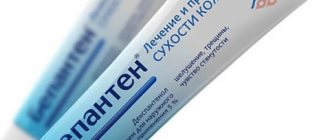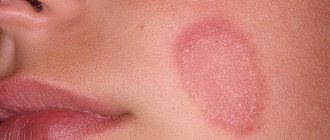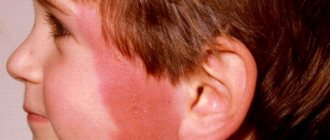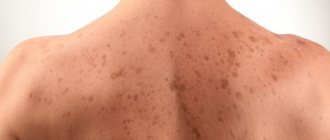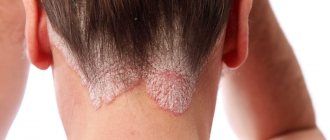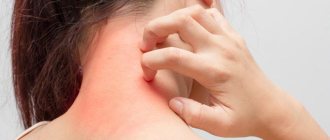Causes
There are a large number of different dermatological ailments, for the treatment of which modern and proven methods are used. These are all kinds of dermatitis and dermatoses, allergic reactions, urticaria, fungal skin infections, etc. But a rash on the body does not always indicate the presence of a serious dermatological disease.
With nervous exhaustion, a significant number of diseases of internal organs develop, many of which occur in a latent form and may not make themselves felt for a long time. This cannot be said about rashes and spots that appear for the same reason, since it is impossible not to notice them. The treatment of spots that appear as a result of nervous shock requires a special approach.
The main lesions of the skin arising from nervous system:
- hives;
- nervous scabies;
- nervous allergies;
- psoriasis;
- eczema;
- vitiligo;
- lichen.
Nervous skin problems in most cases affect women rather than men, since the fairer sex is much more emotional and prone to neuroses, as a result of which the symptom in question appears on the skin.
The main reasons why the epidermis is damaged due to nerves:
- stress often weakens the human immune system, causing the skin to suffer;
- genetic predisposition plays an important role in this matter;
- excessive sensitivity and emotionality often leads to neuroses and the appearance of red spots on the skin;
- a tendency to depression makes a person more emotional and irritable, and if this condition becomes permanent, the immune system is weakened and an allergic rash forms on the skin of the body and face.
Treatment
Nervous spots on the body are treated according to one standard regimen, but depending on the severity of the disease and its individual characteristics, the specialist adjusts the medications.
The following drugs are used:
- Calming agents. Nervous tension, irritability, poor sleep only aggravate the situation. Spots are a result, not a cause, and therefore they need to be dealt with only after emotional and mental balance has been restored.
- Immunomodulating drugs. Even frequent and serious stress attacks on an organism with good immunity are not capable of provoking the appearance of chronic spots on the body or requiring special treatment.
- Antihistamines. They allow you to get rid of hidden allergens and stop the symptom of itchy skin irritation.
- External products for direct treatment of rashes or blemishes. Their task is to relieve swelling, inflammation, restore smoothness, natural color and elasticity of the skin.
Important! In case of severe illness, experts recommend their patients to go to the sea. Salty air dries the skin, helps it cope with the problem on its own and relieves nervous tension.
Nervous urticaria
signs of a nervous allergy in the photo
Urticaria is characterized by the appearance of peculiar blisters on the dermis, similar to stings or a nettle burn. Blisters can be localized on any area of the body, and they can change their location over time. At first they may appear on the hands, and the next day it is possible that symptoms of urticaria may appear on the back or stomach, etc.
If urticaria has developed specifically because of nervousness, then a person, in addition to spots and rashes on the surface of the epidermis, may experience the following symptoms:
- difficulty breathing;
- pressure in the heart area;
- anxiety and nervousness;
- decreased appetite;
- trembling in the arms and legs.
A rash with urticaria is usually accompanied by intense itching, as well as swelling of the mucous membranes. The blisters can be very large and merge with each other, affecting larger areas of the epidermis.
The causes of nervous urticaria are considered to be disruptions in the digestive and reproductive systems, diseases of the nervous system, mental disorders, as well as problems with the heart and blood vessels.
If the above symptoms occur, consultation with a specialist is required to establish the most accurate diagnosis and prescribe appropriate treatment. Consultation is necessary not only with a dermatologist, but also with a neurologist, taking into account the causes of urticaria.
Diagnosis of urticaria in this case includes the following measures:
- general blood analysis;
- urine and stool tests;
- analysis to identify allergens;
- ECG;
- study of the state of immunity;
- brain research, etc.
Treatment of urticaria due to nervousness should be comprehensive. It is necessary to eliminate the cause of its occurrence, namely, reduce the activity of the nervous system, eliminate the tendency to irritability and anger, fear and anxiety. You can make an appointment with a psychotherapist or psychologist for training.
A change of scenery, spa treatment, or just a trip to another city is useful. It is important to try to avoid stressful situations for treatment to be most effective.
Doctors often prescribe antihistamines to relieve symptoms of nervous urticaria, such as Tavegil, Cetrin, Suprastin, Zodak, Fenkarol, Zyrtec, Diazolin and others. To relieve the symptoms of itching, the old proven drug Diphenhydramine is used. But for relapses of urticaria, hormonal medications are used.
Treatment of nervous urticaria will be more effective if, simultaneously with drugs for oral administration, ointments for topical application are used:
- Flucinar;
- Fluorocort;
- Lorinden S
- Betnovat;
- Lokoid;
- Elokom et al.
You cannot make your own decision about choosing one drug or another for the treatment of neurogenic urticaria, since this is fraught with serious complications for your own health.
Among the traditional methods of treatment, there is an infusion of wormwood, which must be taken orally in small doses.
To calm your nerves, you can drink an infusion of motherwort, knotweed, mint or chamomile, or simply eat a cube of dark chocolate. It is equally important to follow a special therapeutic diet, which involves excluding from the diet those foods that can cause allergic rashes on the skin, such as with urticaria.
As a preventative measure, you need to learn to control yourself during stressful or conflict situations, especially if you have a tendency to develop urticaria due to nervousness. It is better to take valerian or another sedative in time.
Nervous scabies
Diseases arising from nervous system are very difficult to identify. More precisely, it is not always possible to understand that the disease began to bother us precisely after the stress suffered. There are often cases in which a rash appears on the body after a certain amount of time. The following symptoms are characteristic of nervous scabies:
- red rash on various parts of the body;
- intense itching and swelling in the affected areas;
- general deterioration of health;
- increased body temperature;
- anxiety, etc.
in the photo the symptom is a rash due to nervousness.
Such symptoms may indicate a variety of dermatological diseases, so a visit to a competent doctor is necessary, who will determine the exact cause of these symptoms.
It is very important to get rid of nervous scabies in time, since this disease can become chronic if left untreated. First of all, it is necessary to eliminate the cause that caused the development of the disease.
Due to severe itching with neurogenic scabies, most patients cannot resist and begin to scratch the affected areas of the skin with their nails. As a result, damage and wounds occur through which infection can enter the body. In this case, the disease will become more complicated and the treatment process will be delayed.
Therapy for the disease includes the use of sedatives, for example, motherwort, valerian, mint tea, lemon balm, hops, etc. You can use aromatherapy, which is famous for its beneficial properties that are important for normalizing a person’s emotional state.
In more complex cases, the patient is prescribed strong sedatives or antidepressants. To eliminate itching, you can use anti-allergy medications, as well as ointments for applying to diseased areas of the epidermis, such as Hydrocortisone, Photorocort, etc.
It is advisable to visit a psychologist to learn how to control yourself in the most unfavorable life situations.
You also need to reconsider your lifestyle, daily routine and nutrition.
How to recognize a nerve rash
A nervous rash has several symptoms:
Small rashes can be of any shape, location and color. And they arise both immediately after stress and after a while. White spots appear some time after a traumatic event. Red spots often appear immediately after stress (conflict, fear, scandal). They have an aggressive red tint. Below are examples of spots on the body due to nervousness (photo).
Nervous allergies
It is generally accepted that allergic reactions in humans can only occur due to exposure to any chemicals, food, dust, wool, etc. But not everyone knows that allergies often arise as a result of frequent stress, prolonged depression, conflict situations, etc.
Under the influence of excessive emotional stress, many mediators begin to be released in the body, which provoke the development of inflammatory processes in the body. And it doesn’t matter what kind of products the patient consumed, an allergic reaction will occur in any case.
Reasons why nervous allergies occur:
- low stress resistance;
- tendency to depression;
- hereditary predisposition;
- weakening of the immune system for various reasons.
Nervous allergies most often affect women and children, as men are more reserved and less emotional.
Symptoms of allergies due to nerves:
- rashes on the limbs, head, neck and chest;
- the affected areas of the skin may itch;
- a runny nose and cough appear, but there are no other symptoms of colds;
- difficulty breathing;
- sneezing;
- lacrimation;
- tachycardia.
If a person’s neurogenic allergy takes a chronic form, then under the influence of stressful situations and other provoking factors the patient may experience such serious health problems as:
- headache and dizziness;
- weakness and fatigue;
- temporary blurred vision;
- increased drowsiness.
Doctors call such conditions an allergic vegetative storm, which can last for years. All of the above symptoms occur at a time of emotional overstrain. When calm sets in, these signs disappear without a trace.
It is very difficult for doctors to identify nervous allergies due to the strong similarity of symptoms with other diseases. For diagnosis, skin tests are taken to identify allergens, and the level of immunoglobulin is determined, which gives normal values in case of nervous allergies.
As with other nervous diseases, in this situation all efforts must be directed towards preventing stress in the patient and calming the nervous system. To do this, you can use the services of a psychotherapist, physiotherapy, and taking natural sedatives, vitamin substances, and allergy medications is also useful. To avoid aggravating skin reactions, it is better to avoid using body cosmetics.
Itching and inflammation on the skin are well relieved by water with the addition of vinegar, soda solution, and tomato juice. It is necessary to give up bad habits, try to lead a healthy lifestyle, spend more time in the fresh air and take walks. Such measures not only strengthen the immune system, but also have a beneficial effect on the nervous system.
What tests need to be taken
In order to distinguish allergies from nervous dermatitis, you need to undergo a series of tests that allow you to identify the correct diagnosis with maximum accuracy and establish the causes of the disease.
One of the first is a blood test to determine the number of leukocytes in the blood serum as a percentage. You will also need to take stool and urine tests to check for worms. If it turns out that eosinophils are elevated in the blood serum, then we can talk about allergies.
If the doctor suspects that some food product or external irritant is responsible for the red spots on the body and the rash, allergy tests may be required to help assess the body's sensitivity to a particular allergen. An allergic reaction in the form of swelling, as well as spots on the body or inflammation indicate that the irritant has been found.
A blood test is necessary to make a correct diagnosis
We invite you to familiarize yourself with Squamous cell carcinoma in cats
Nervous psoriasis
Psoriasis is a non-contagious dermatological disease that occurs for various reasons, including nerves. It is also called lichen planus.
Doctors have established a connection between a person’s negative emotional state and the development of psoriasis.
Symptoms of the disease:
- the appearance of typical psoriatic plaques with white scales on various parts of the skin of the body;
- the rash is accompanied by severe itching;
- anxious nervous state of the patient.
in the photo there are spots due to nervousness.
During negative emotional outbursts, the immune system malfunctions, as a result of which metabolic processes in the dermis are disrupted. It is for this reason that plaques of psoriasis form on the skin.
This dermatological disease can affect the scalp, resulting in severe itching of the scalp and the formation of a rash. But if a person does not have a tendency to develop this body reaction to stress, then under any unfavorable conditions or conflict situations, symptoms of psoriasis will not arise.
Treatment of nervous psoriasis, as well as other diseases caused by frequent stress, should be comprehensive and include several main areas. The therapy process is quite complex and lengthy and, above all, requires emotional self-control.
It is advisable to prescribe the following sedatives:
- valerian;
- Sedavit;
- Magne B6;
- Fitosed et al.
To treat skin lesions, salicylic alcohol, birch tar, ointments with sulfur and zinc, and some essential oils are used. Some patients are prescribed autohemotherapy, acupuncture, and physiotherapeutic procedures.
Nervous eczema
Another dermatological disease that develops against the background of stressful situations and a negative emotional state is eczema. The main symptoms of nervous eczema:
- the appearance of characteristic spots on the hands and other parts of the body;
- affected areas of the skin are characterized by the presence of small bursting blisters, as well as swelling, peeling, itching and inflammation;
- sleep disturbances, irritability, deterioration of well-being.
Skin rashes first look like weeping wound surfaces, which subsequently become covered with crusts. In case of extensive weeping lesions of the epidermis, hospitalization of the patient is required in order to prevent skin infection and the development of adverse consequences.
Basic principles of treatment of neurogenic eczema:
- refusal to use chemicals (detergents, cosmetics, etc.)
- refusal to wear clothes made of synthetic materials;
- taking sedative medications;
- use of ointments, lotions, compresses for external use;
- to prevent the addition of a secondary bacterial infection, antibiotics are required;
- use of anti-allergy medications;
- working with a psychologist, conducting trainings, hypnosis;
- physiotherapy, massage, acupuncture;
- strengthening the immune system, taking vitamin complexes
Most often, nervous eczema appears on the skin of the hands. The result is not only a significant difficulty in the treatment process, but also psychological discomfort.
Treatment of neurodermatitis
“Two specialists should simultaneously treat pathology – a neurologist and a dermatologist.” First of all, patients are shown anti-inflammatory, antiseptic, antihistamine medications, and most importantly, sedative medications that have a calming effect. If treatment is not initiated in a timely manner, then dermatitis gradually transforms into a skin infectious disease, which is much more difficult to combat.
The main task of treating nervous dermatitis is to improve the functioning of the human central nervous system. Both medications, for example, Novo-Passit, and familiar folk remedies: valerian, motherwort tincture are suitable for this purpose.
Symptoms of the pathology, such as burning and itching, are eliminated using local remedies - ointments and creams. Sometimes they are supplemented with desensitizing drugs.
Dermatitis from nerves can also be treated with folk remedies, but they are rather functional additions to the traditional therapeutic course. Below we outline the most effective recipes from the “home pharmacy” category:
- You can prepare a decoction based on birch buds: take the same amount of boiling water for one glass of the product and boil the mixture for 15-20 minutes. After the product has cooled, it is necessary to strain it. Wipe the areas affected by dermatitis with the decoction several times a day until the symptoms disappear completely;
- It is recommended to apply grape leaves to areas of inflammation;
- Compresses and wraps are prepared from a decoction of oak bark (2 tablespoons of powder per glass of boiling water);
- you need to mix the butter with half-evaporated St. John's wort juice in a 4:1 ratio. You can store this product in the refrigerator, lubricating the affected areas of the skin with it from time to time. St. John's wort juice is an excellent disinfectant;
- For 10 dried fireweed leaves you will need a glass of boiling water. The mixture is cooked for 15 minutes. The product is infused for two weeks, after which it is carefully filtered. The decoction must be stored in a dark bottle. The areas of inflammation should be lubricated several times a day;
- You should grate the potatoes, after which the pulp can be applied to the affected areas of the skin;
- For 50 ml of fresh cranberry juice you will need 200 g of Vaseline. The ingredients are mixed and mashed thoroughly. The product is used as a medicinal ointment;
- To relieve itching, a mixture of Kalanchoe juice and bee honey is suitable (the ingredients are taken in equal proportions). The product is infused for a week, after which the same amount of aloe juice is added to it. Then the mixture is infused for another seven days. The finished mass is applied to areas of the epidermis affected by dermatitis;
- celery root is poured with cold water and infused for two hours. The drug is taken orally, 200 ml per day.
We invite you to familiarize yourself with 7 Russian stars who died from smoking
Preventive measures for nerve dermatitis include the following components:
- periodic stimulation of the immune system;
- a proper diet that does not contain foods that have a stimulating effect on the patient’s psycho-emotional state;
- It’s a good idea to use aromatic oils from time to time - they have a calming effect on the nervous system;
- patients with neurodermatitis are advised to take long walks in the fresh air;
- drug support for the adequate state of the patient’s nervous system.
The patient is recommended to completely modify his usual way of life:
- adjust your daily routine;
- organize sanatorium-resort therapy;
- take care of your psycho-emotional state - do not expose yourself to stress, do not become depressed.
Neurodermatitis is a skin pathology that occurs due to various nervous disorders. The disease manifests itself as a skin rash, itching, and characteristic reddish spots that may peel off.
Treatment of the disease begins with taking sedatives; if necessary, antihistamines, anti-inflammatory drugs and antiseptic ointments are added to them. Traditional therapy is complemented with homemade folk recipes.
Treatment of nervous dermatitis should be carried out by a dermatologist and a neurologist. Independent attempts to overcome the disease can lead to its relapse and cause a number of complications.
*Insults, racial discrimination, political debates, obscene language, etc. are prohibited.
Why does the temperature rise due to nervousness?
An increase in body temperature due to stress is a fairly common and common phenomenon. This usually happens in cases where negative emotions are suppressed, and there is no possibility of their splashing out, which should manifest itself in crying, crying or screaming.
As a result, not only can the temperature rise, but many other, more serious problems can arise. Most often, the following diseases develop against the background of regular negative emotional outbursts:
- respiratory tract lesions;
- peptic ulcer and other diseases of the digestive system;
- migraine;
- heart and blood vessel diseases;
- dermatological diseases, etc.
Almost all of the ailments mentioned are accompanied by an increase in body temperature.
It has been established that self-confident, successful and sociable people experience almost no consequences of stress. But with an excess of negativity, aggression and hostility, there may be cases of diseases of the cardiovascular system, hypertension, skin lesions, as a result of which body temperature may rise. And calm and unsociable individuals are usually prone to the accumulation of emotions, which ultimately lead to serious damage to the digestive and respiratory organs.
To prevent the occurrence of dermatological problems, people prone to developing the skin lesions in question are advised to follow several rules:
- first of all, avoid stress and negative emotions as much as possible;
- strengthen the nervous system, do yoga;
- exercise;
- drink tea with the addition of healing soothing herbs such as chamomile, mint, etc.
- Avoid eating foods that can trigger allergies, such as citrus fruits or chocolate;
- provide the body with a full night’s sleep, which should last at least eight hours;
- strengthen the immune system, eat right and take vitamins;
- use natural cosmetics without fragrances and chemicals;
- do not neglect the rules of hygiene;
- Do not delay visiting a doctor if you experience symptoms of various dermatitis that appeared after suffering stress.
Following these recommendations will make life much easier and will allow you to maintain both psychological and physical health.
